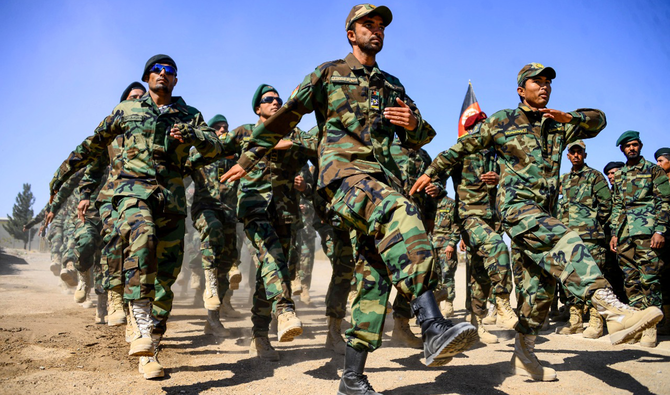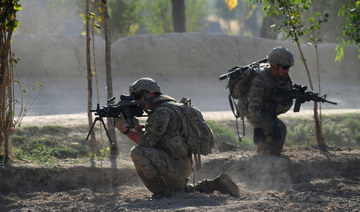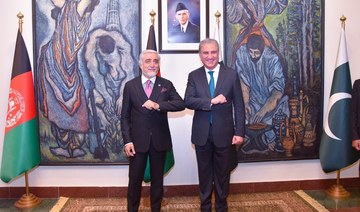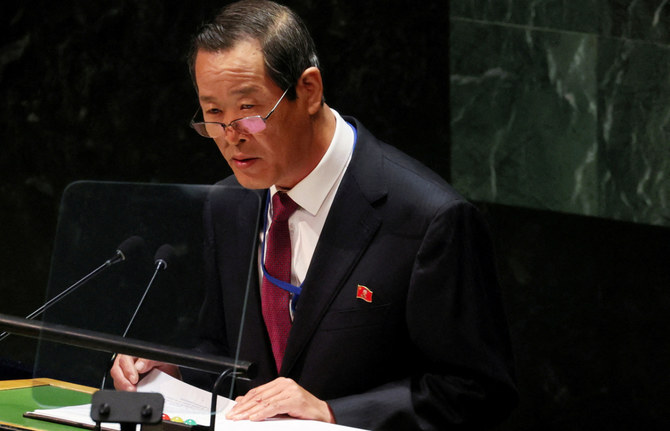KABUL: Kabul officials on Sunday said that negotiations with the Taliban had not reached a stalemate, despite both sides disagreeing on a mechanism for the crucial intra-Afghan talks that end in a month.
“One month on since the talks began in Qatar, we have not been able to agree (on the road map for the talks), yes; however the key part is that we still talk formally and informally,” Nader Nadery, a government-appointed negotiator told Arab News from Doha, Qatar on Sunday.
“None of us (the Taliban and government teams) have said that ‘we have stopped meeting and we will not meet,’ that has not happened, and we are working to meet soon,” he said.
The long-delayed negotiations, which began on Sept. 12 in the Qatari capital, are a crucial part of a historic deal signed between Washington and the Taliban in February this year and include a pledge by US President Donald Trump to withdraw all troops from Afghanistan and work toward ending America’s longest war.
Striking an optimistic note, Najia Anwari, a spokesman for the Afghan government’s Peace Ministry in Kabul, said that there “was no deadlock in the talks” and that the peace process “after so many years of war, will always be complicated and would require time.”
“We are trying to enter into the negotiations with a good method and hopefully will in the coming days finalize the road map and hammer out the differences of views that have existed between the Taliban and government negotiators,” she told Arab News.
However, a source familiar with the matter and requesting anonymity as he was not authorized to speak to the media, said that a “supporting group” comprising mediators and diplomats from foreign countries, based in Qatar, were planning to intervene if no progress was made in settling the differences that have delayed the start of the main talks so far.
A spokesman for the Taliban was unavailable for comment when contacted by Arab News on Sunday.
The intra-Afghan talks coincide with an internal dispute among government leaders in Kabul over the negotiations, as well as the recent escalation in bloody attacks across the country.
Government officials have long maintained that the Taliban have stepped up their attacks since the signing of the February accord with the US, and intensified them after the start of the intra-Afghan talks.
However, unlike in the past, they “do not publicly take credit for it” now.
Examples of high-profile attacks include an assassination attempt on the governor of the eastern Laghman province last week, which killed eight people, and a massive bomb attack outside a government compound in the adjacent Nangarhar province, which left 15 people dead.
On Saturday, Afghanistan’s intelligence agency said that the Haqqani network, considered the backbone of the Taliban’s military wing — in collaboration with Daesh — was responsible for an attack on first VP Amrullah Saleh in Kabul last month.
Tariq Aryan, a spokesman for the Interior Ministry, said on Sunday that “contrary to the past, the Taliban have certainly increased their attacks” since the Qatar talks began.
Abdul Satar Saadat, a former adviser to Ghani, told Arab News that after signing the deal with Washington, the Taliban consider themselves as “victors of war.”
As a result, “the more there is a delay in talks, the better it is for them as Kabul will be weakened by their attacks,” and this way they do not have to “share power with any side should they take over the country after the US-led troops departure.”
“The Taliban are after a major victory, and at the same time the leadership of the government are not paying any price of the war because their families are overseas and war can improve their economy,” he said.
However, similar to sentiments echoed by ordinary Afghans and other experts, Wahed Faqiri, a US-based Afghan analyst, described the stalemate in talks as worrying.
“The month-long deadlock in talks is indeed not an encouraging sign. Although many predicted that the intra-Afghan talks would not be easy, no one anticipated this level of difficulties,” he said.
Dr. Shaida Abdali, a presidential candidate and Afghanistan’s ambassador to India until last year, said that the process of talks was a “rocky and bumpy road” and a “trust deficit” between the two sides had added to the “talks’ complexities.”
“There could be different calculations on both sides about the timing and prospects of peace talks. However, I am still hopeful that they will be able to find a way out,” she said. “What is crucial here is the perception that the support of the international community might wear thin if the process lingers on for too long. Therefore, there is a need for a sense of urgency on both sides — not to lose the opportunity of carrying along with the world community for continued support during the peace talks, and in the post-peace-building efforts in Afghanistan.”

























